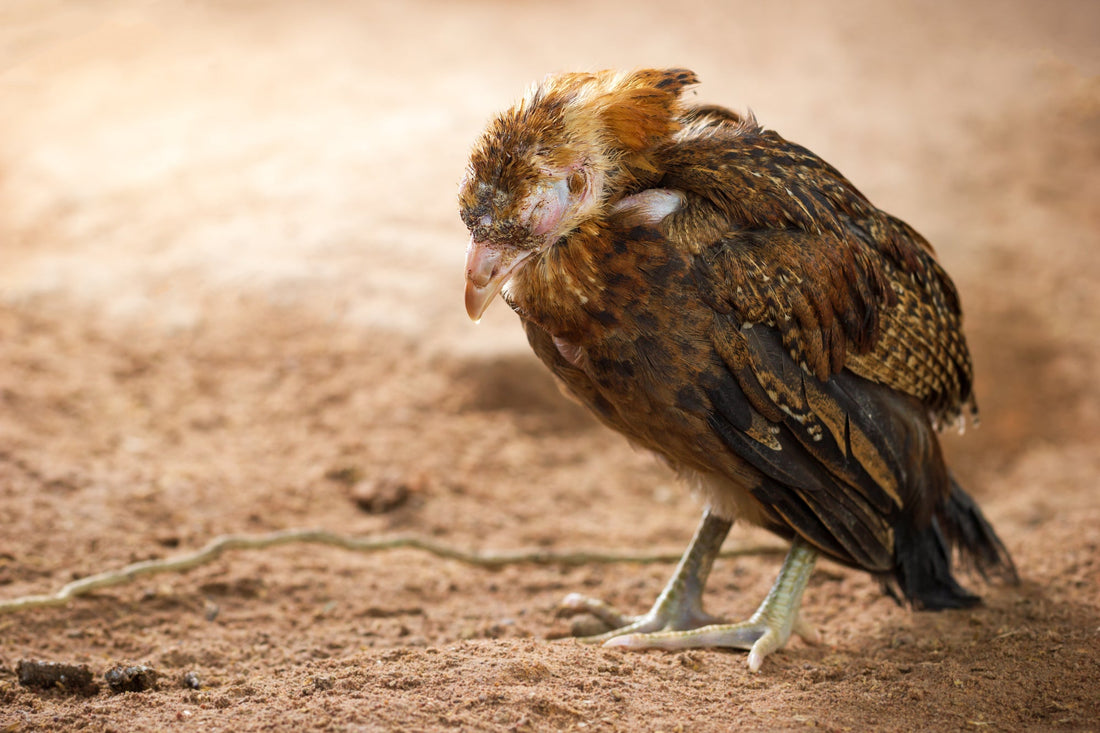Greetings, fellow poultry aficionados! You've seen it all: the first egg, the curious pecking, and the hilarious dust baths. But now, you're facing the chicken equivalent of a sniffle. If your hen's clucking sounds more like sneezing, and you're wondering if chickens need chicken soup, you're in the right place.
10 Tell-tale Signs Your Chicken is Under the Weather
- Sneezing and Coughing: Like humans, chickens can get respiratory issues. This is often their way of saying, "I'm not feeling cluck-tastic."
- Nasal Discharge: A runny beak isn't a hen's way of showing she’s emotional; it's a potential health concern.
- Swollen Eyes or Sinuses: If your chicken's giving you the "puffy" look, it's not attitude; she may be unwell.
- Reduced Egg Production: If your breakfast plate is missing eggs, your hen might be signaling a problem.
- Lethargy: A chicken that's lounging more than pecking could be a lazy bird or a sick bird.
- Changes in Droppings: Poop patrol isn’t glamorous, but it’s a top way to gauge chicken health.
- Loss of Appetite: A chicken that's not eating is like a fish that's not swimming. It's a surefire sign something's amiss.
- Ruffled Feathers: And not in the cute way. If they're looking disheveled, it’s a concern.
- Wheezing or Labored Breathing: Respiratory issues can be serious in chickens. This is a sign to pay attention to.
- Change in Comb Color: A pale or discolored comb might be an indication of poor circulation or other health issues.
Nature to the Rescue: 10 Natural Remedies
- Garlic: An immune booster that's perfect for your hen’s health (and keeps the vampires at bay).
- Apple Cider Vinegar: A bit in their water can aid digestion and act as a preventive tonic.
- Vitamin and Electrolyte Supplements: For when your chicken needs a bit of a pep in its step.
- Oregano: This herb's not just for pizza. It’s a natural antibiotic for chickens.
- Echinacea: Boosts the immune system and can be sprinkled into their feed.
- Cinnamon: Good for general health and can deter ants from the feed.
- Lemon Balm: Acts as a natural insect repellent and also has calming properties.
- Turmeric: With its anti-inflammatory properties, it's a super spice for chicken health.
- Honey: A natural antibacterial agent. Can be added to their water or given directly for minor internal issues.
- Aloe Vera: For any external wounds or irritations, aloe vera is nature's salve.
10 Cluck-worthy Preventive Measures
- Regular Clean-Up: A clean coop is a happy coop. It minimizes disease risk.
- Vaccinations: Keep up with recommended vaccines for common poultry diseases.
- Quarantine New Birds: Always quarantine newcomers for at least 30 days to ensure they don't introduce diseases.
- Healthy Diet: Ensure they get the right nutrients. A well-fed chicken is a strong chicken.
- Fresh Water: Always provide clean, fresh water.
- Limit Visitors: Limit the number of people who enter your coop, especially if they have birds of their own.
- Regular Check-ups: Periodic vet visits ensure that minor issues don’t become major ones.
- Pest Control: Regularly check for and eliminate pests like mites, lice, and worms.
- Spacious Coop: Overcrowding can lead to stress and disease spread. Ensure ample space for each bird.
- Keep Stress Low: Happy chickens are healthy chickens. Avoid sudden changes and provide a calm environment.
While chickens can't tell us when they're feeling under the weather, they surely show us. With attentive care, a sprinkle of natural remedies, and preventive measures, you can ensure your flock stays happy, healthy, and ready to lay those breakfast eggs. 🐔🌿🍳
Being a chicken parent is a joy, filled with feathery cuddles, and the occasional comical chase. But, as with all pets, there come responsibilities. With keen observation and a well-stocked natural remedy shelf, you can ensure they're back to their pecking, clucking selves in no time.
Remember, the key is observation, swift action, and, of course, a little chicken TLC. Because even when they're under the weather, in our eyes, they're still egg-ceptional! 🐔❤️🍃

